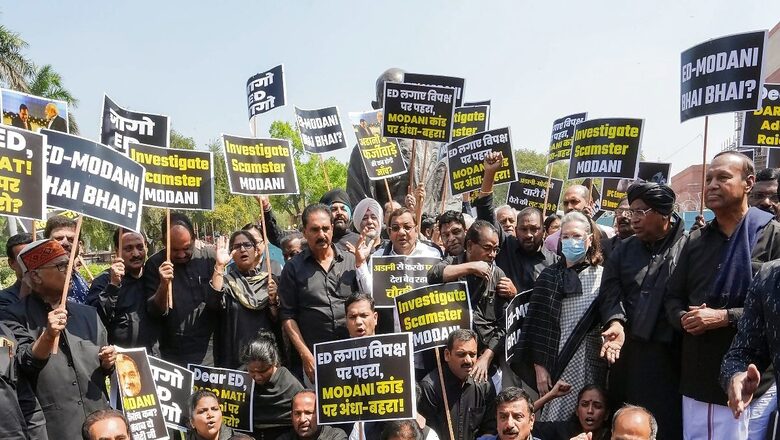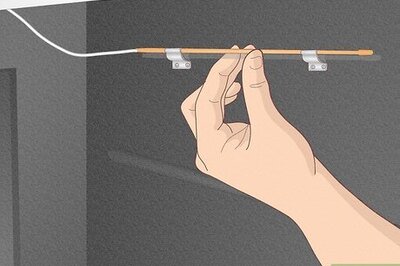
views
In our parliamentary democracy, there has always been a ruling party and an Opposition. Both play pivotal roles and it is essential that they cooperate for the greater benefit of the nation. It may even be argued that the Opposition plays a considerably bigger role than the ruling party because raising issues and asking questions keeps democracy alive. If there is no Opposition, the ruling party can become autocratic, which may be tantamount to the cessation of democracy. The importance of the Opposition and the ruling party to a functioning democracy has been extensively discussed in the literature. However, this is not the main subject of this piece.
The Indian investigating agencies — the central agencies, as many would like to enunciate — have been questioning Opposition party leaders in several matters, including corruption, for a while now. This includes leaders like Sonia Gandhi, Rahul Gandhi, Tejashwi Yadav, Arvind Kejriwal, and others. However, it is simply ironic that all of these bigheads and self-declared flagbearers of the Indian democracy go berserk when the democratic system functions under the ambit of Constitutional powers vested in it — of course, when the show bites on the other foot — and then the “democracy is in grave danger, if not already dead” theory is touted. Much of this ado that the Opposition creates reeks of uncouthness, indecency, and bumptiousness. We have seen the votaries of the fodder scam convict pontificating on corruption on one hand, while a sitting chief minister demands the highest civilian award, the Bharat Ratna, for one of his kattar imaandar (staunchly honest) former minister, languishing in prison for almost a year. All this democratically!
The nation has witnessed Rahul Gandhi’s party’s prominent leaders and a sizable number of workers sabre-rattling and muscle-flexing when the scion appears in court in Gujarat for a hearing. In fact, when Arvind Kejriwal appeared for questioning, the Speaker of the Delhi Assembly sat in the dharna set up by his party. Almost the same protests and road-blocking were observed when the Enforcement Directorate (ED) summoned Sonia and Rahul Gandhi, and Manish Sisodia. All this anarchy and non-compliance for matters that abide by Constitutional jurisprudence?
PM Modi has done nothing but discombobulated and dislodged the Opposition. On matters of national security and the jurisdiction of central agencies, the Opposition attacks the governmental agencies as if it were the Government of Pakistan and not India. They chide the Indian government in the language of Pakistan. Even when a court sentences a terrorist to prison, the Opposition has been heard reviling the former and somehow pinning the blame onto the government. There are other such concerns, and it is acutely distressing to see the Opposition’s irresponsible demeanour. And the worst issue is how politicians like Rahul Gandhi act in a juvenile and lawless manner.
The people of India and the Opposition should not forget that Narendra Modi and Amit Shah also faced investigative agencies during the United Progressive Alliance (UPA) government. The interrogation took place for many hours and many days. Appreciably, neither Narendra Modi nor the Bharatiya Janata Party (BJP) resorted to cheap theatrics or vandalism. Rather, they plausibly conformed with the agencies. This is veritably corroborated by the startling revelations made by RK Raghavan, the chief of the Special Investigation Team (SIT) formed to investigate the 2002 Gujarat violence, in his 2020 memoir, A Road Well Travelled.’ It reveals how Narendra Modi behaved when probed by government agencies, which stood in sharp contrast to the Opposition’s reaction. On Modi’s questioning, Raghavan recalls, “We had it conveyed to his (CM’s) staff that he (Modi) had to come in person to the SIT office for this purpose and that meeting him elsewhere would be misconstrued as a favour. He understood the spirit of our stand and readily agreed to come to the SIT office within the government complex in Gandhinagar.” Modi’s questioning lasted nine hours. “Ashok Malhotra (the SIT member who interrogated the CM) told me later that Modi kept his cool right through the marathon session, which ended late at night. He never parried questions. Nor did he give the impression of padding up his responses,” Raghavan reveals. When Malhotra asked him whether he would like to break for lunch, Modi initially turned down the offer. “He brought his own bottle of water and did not accept even a cup of tea from the SIT during the marathon questioning comprising a hundred odd questions.”
Also, retrospecting on history, during his tenure as PM, PV Narasimha Rao deputed Atal Bihari Vajpayee as leader of the Indian delegation to the 1994 special session of the United Nations Human Rights Commission (UNHRC) in Geneva, where a Pakistan-sponsored resolution to censure India on its record of human rights in Jammu and Kashmir was successfully thwarted. Rao’s gesture did not go down well within his party.
When the then President, Dr Shankar Dayal Sharma, appointed Vajpayee as the prime minister and asked him to prove his majority on the floor of the house, Rao quietly passed on a chit to Vajpayee at the Rashtrapati Bhavan swearing-in ceremony, in which Vajpayee said, “Now is the time to accomplish my unfinished task.” The task Narasimha Rao failed to accomplish during his premiership was the nuclear tests at Pokhran.
During the 1971 India-Pakistan War, Vajpayee, as the President of the Jan Sangh, the leading Opposition party that later evolved into the present-day BJP, remarked, “The prime minister must now lead the country to total victory over the enemy. If the government wanted to secure any more powers to handle the situation, this party would not hesitate to accord its fullest cooperation.”
In the history of modern India, both the ruling party and the Opposition have mostly worked together, barring the communists, taking into account the larger national interest. But the present Opposition has gone astray. The sense of entitlement, elitism and feudalism that the family-run parties exhibit is vehemently unacceptable to the populace and the electorate — visibly amplified post-2014 — that feels a connect with PM Modi. All said and done, there is a thick distinction between opposing Modi and opposing Bharat. In the short-sighted goal of discrediting PM Modi, these Opposition parties stoop to new lows of flouting the laws that entail anarchism and only dent the public perception. Decency in public discourse is the need of the hour.
Yuvraj Pokharna is an independent journalist and columnist; Dr Mahender Thakur is a columnist and social activist. Views expressed are personal.
Read all the Latest Opinions here




















Comments
0 comment